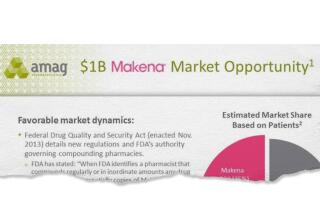FDA Warns Against Initial Use of Rezulin
- Share via
WASHINGTON — The Food and Drug Administration warned doctors Wednesday that they should no longer prescribe the popular diabetes drug Rezulin as an initial treatment for the disease.
The agency announced that “new safety information” about Rezulin’s association with liver failure indicates that the medication should be used only if other drugs have failed to control a patient’s blood-sugar level.
“We’re now recommending that Rezulin no longer be used as initial therapy in diabetes,” Dr. John K. Jenkins, the new director of one of the FDA’s four drug evaluation offices, said in an interview. “It’s a movement toward [making Rezulin] a second-line therapy.”
The agency action, while allowing Rezulin to remain on the market, is a blow to a drug that has been widely used since its introduction in 1997. Rezulin has generated revenue exceeding $1.4 billion for New Jersey-based Warner-Lambert Co.
The FDA’s announcement capped an unusual five-month reevaluation, undertaken in response to a Los Angeles Times series published in December. The articles disclosed that the FDA had overlooked warnings of danger in granting “fast-track” approval to Rezulin.
In a statement Wednesday, a Warner-Lambert executive, Dr. Robert L. Zerbe, said: “Our primary concern has always been the health and safety of diabetes patients.”
The FDA action came after an agency advisory panel in March recommended that Rezulin not be used as a stand-alone “monotherapy” for Type 2 diabetes.
At a panel hearing, Dr. David J. Graham, the agency’s senior epidemiologist, said it is likely that at least 430 Rezulin patients have suffered acute liver failure.
The FDA’s announcement marked the fourth time that the agency has altered the safety-related labeling of Rezulin since the drug first went on sale two years ago. Jenkins said that he was not aware of another drug that has been the subject of so many warnings in such a short time.
The new warning, Jenkins said, should “significantly decrease the number of patients who would be candidates for Rezulin.”
The FDA’s examination of Rezulin has been watched closely by the pharmaceutical industry because of the number of patients with adult-onset, or Type 2, diabetes.
An estimated 15 million Americans have the condition, characterized by high blood-sugar. Type 2 diabetes is distinct from juvenile-onset, or Type 1, diabetes, which afflicts about 800,000 Americans.
Rezulin was withdrawn from sale in Britain in December 1997 because of liver-failure deaths. The British government refused three months ago to allow reintroduction of the drug.
Warner-Lambert has sought to play down Rezulin’s role in causing liver damage. And the company has aggressively marketed the drug, using direct-to-consumer magazine advertising and concerted promotions to doctors.
The new labeling for Rezulin calls for patients to submit to liver-function testing for the first 12 months of treatment, instead of the first 10 months. In the second year, patients should be tested “quarterly” instead of “periodically.” Moreover, a new “patient information sheet” on the drug’s dangers will be made available through pharmacists.
The FDA action follows but does not entirely mirror recommendations made March 26 by the agency advisory panel.
While the panel cautioned against using Rezulin as a sole therapy, the FDA recommended that Rezulin not be prescribed at all unless other drugs are tried first. In addition to its use as a stand-alone diabetes pill, Rezulin typically has been prescribed in combination with other diabetes pills and with insulin.
On Wednesday, the FDA approved using Rezulin in combination with insulin and Glucophage, the top-selling diabetes pill, if the latter two drugs are not effective alone.
In addition to the liver failure cases, Graham cited data at the March advisory committee hearing showing that fewer than 1% of Rezulin patients had complied with the existing liver-monitoring recommendations.
Asked why the FDA is leaving Rezulin on the market, Jenkins said: “We still believe that in certain patients the benefit of the product outweighs the risk.”
Jenkins also indicated, however, that FDA officials would weigh whether there remains any therapeutic niche for Rezulin if a drug launched last week of the same chemical class, called Avandia, proves safer. In clinical tests, Avandia showed virtually no liver toxicity.
“I think we’re going to continue to monitor and evaluate Rezulin on a regular basis,” Jenkins said.
A series of Times stories on the FDA approval of Rezulin and deaths related to its use is on The Times’ Web site: https://www.latimes.com/rezulin
More to Read
Sign up for Essential California
The most important California stories and recommendations in your inbox every morning.
You may occasionally receive promotional content from the Los Angeles Times.














